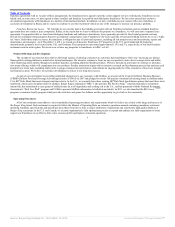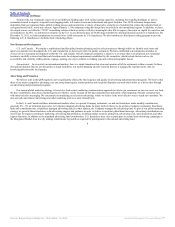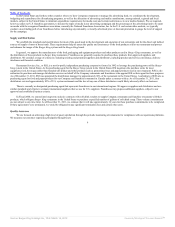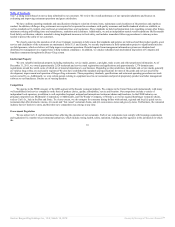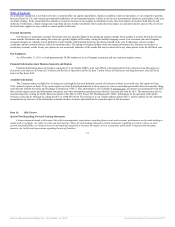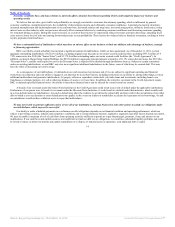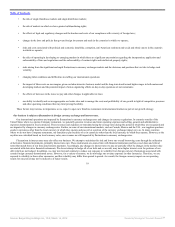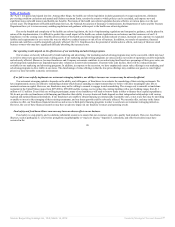Burger King 2011 Annual Report Download - page 18
Download and view the complete annual report
Please find page 18 of the 2011 Burger King annual report below. You can navigate through the pages in the report by either clicking on the pages listed below, or by using the keyword search tool below to find specific information within the annual report.
Table of Contents
restaurants in a specific country or region. A joint venture partnership involves special risks, such as our joint venture partners may at any time have economic,
business or legal interests or goals that are inconsistent with those of the joint venture or us, or our joint venture partners may be unable to meet their economic or
other obligations and we may be required to fulfill those obligations alone. We cannot control the actions of our joint venture partners, including any
nonperformance, default or bankruptcy of joint venture partners. If we cannot successfully manage the relationship with a joint venture partner, we may not be
able to terminate the agreement with the joint venture partner, or enter into other agreements for the development and management of restaurants in a country or
region covered by the joint venture agreement. While we believe that our joint venture arrangements provide us with experienced local business partners in
foreign countries, events or issues, including disagreements with our partners, may occur that require attention of our senior executives and may result in
expenses or losses that erode the profitability of our foreign operations. Failure by us, or an entity in which we have a joint venture interest, to adequately manage
the risks associated with any joint ventures could have a material adverse effect on the financial condition or results of operations of our joint ventures and, in
turn, our business and operations.
In addition, our ability to implement our global portfolio realignment project in certain geographical areas may be limited by tax, accounting or other
regulatory considerations.
Our future prospects depend on our ability to implement our strategy of increasing our restaurant portfolio.
We plan to significantly increase worldwide restaurant count. A significant component of our future growth strategy involves increasing our net restaurant
count in our international markets. We and our franchisees face many challenges in opening new restaurants, including, among others:
• the selection and availability of suitable restaurant locations;
• the impact of local tax, zoning, land use and environmental rules and regulations on our ability and the ability of our franchisees to develop
restaurants, and the impact of any material difficulties or failures that we and our franchisees experience in obtaining the necessary licenses and
approvals for new restaurants;
• the negotiation of acceptable lease terms;
• the availability of bank credit and, for franchise restaurants, the ability of franchisees to obtain acceptable financing terms;
• securing acceptable suppliers;
• employing and training qualified personnel; and
• consumer preferences and local market conditions.
In the past, we have approved franchisees that were unsuccessful in implementing their expansion plans, particularly in new markets. There can be no
assurance that we will be able to identify franchisees who meet our criteria, or if we identify such franchisees, that they will successfully implement their
expansion plans.
Our international operations subject us to additional risks and costs and may cause our profitability to decline.
As of December 31, 2011, our restaurants were operated, directly by us or by franchisees, in 81 countries and U.S. territories (including Guam and Puerto
Rico, which are considered part of our international business). During 2011, our revenues from international operations represented 33% of total revenues and we
intend to continue expansion of our international operations. As a result, our business is increasingly exposed to risks inherent in foreign operations. These risks,
which can vary substantially by market, are described in many of the risk factors discussed in the section and include the following:
• governmental laws, regulations and policies adopted to manage national economic conditions, such as increases in taxes, austerity measures that
impact consumer spending, monetary policies that may impact inflation rates and currency fluctuations;
17
Source: Burger King Holdings Inc, 10-K, March 14, 2012 Powered by Morningstar® Document Research℠


